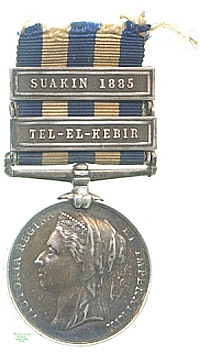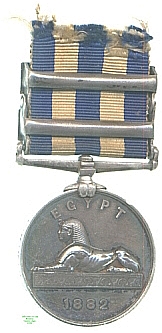
Obverse, a bust of Queen Victoria with veil

Reverse, the Sphinx on a pedestal facing left

Obverse, a bust of Queen Victoria with veil |

Reverse, the Sphinx on a pedestal facing left |
Victorian-period Egypt was technically a dependency of the Ottoman Empire, but in fact the Khedive, Tewfik Pasha, was effectively in the hands of Britain and France, for whom control of the Suez Canal was a strategic necessity. Egypt's shaky economic situation endangering this, in 1879 Britain and France took over government in an arrangement of dual control. This foreign influence was much resented in Egypt, and especially within the army. A Colonel by the name of Ahmad Urabi (Arabi Pasha) became the spearhead of the movement, which launched a coup in 1882. After some international indecision this was suppressed by British arms, the final blow being delivered at the Battle of Tel-al-Kebir, where a British force of 17,000 men under General Sir Garnet Wolseley stormed a superior Egyptian force in heavily-defended positions in a surprise attack by night. Urabi was captured and exiled to Ceylon.
The weakening of Ottoman Egyptian power meanwhile led to increasing attempts to shed Egyptian dominion in the Sudan, where in 1881 Sheikh Muhammad Ahmad ibn al-Sayyid 'Abd Allah was proclaimed as Mahdi (the legendary final redeemer of Islam). He and his allies soon threatened to remove the Sudan entirely from the Khedive's control. Several serious defeats of Egyptian forces in 1884 led to a concerted British campaign in defence of Egyptian claims, but control could not be recovered. The British withdrew their forces to Egypt and to Khartoum, where General Gordon defended the city whilst awaiting a relief column that, beset by Mahdist attacks, arrived too late.
After this disaster Suakim, on the Red Sea, remained the last British bridgehead in Sudan, and was subject to a number of sieges. The Suakin Field Force, formed to defend this outpost, were repeatedly engaged by Mahdist troops without much conclusion beyond heavy casualties to either side, until the eventual complete British withdrawal in 1890.
This medal was awarded to Driver T. Caulfield of the 6th Battalion, Royal Horse Artillery, and indicates his presence at both the battle of Tel-al-Kebir and one of the heavy skirmishes in defence of Suakim. Lester Watson acquired the medal at some point before 1928.